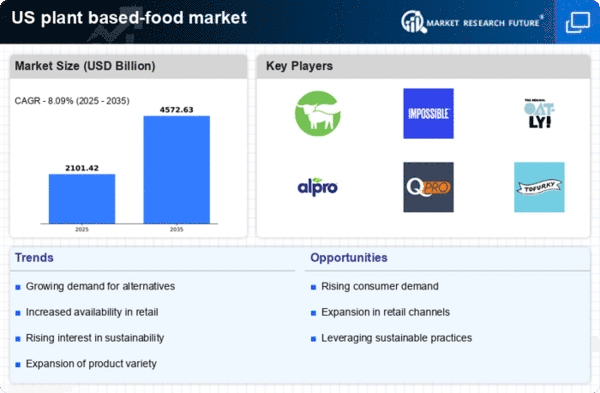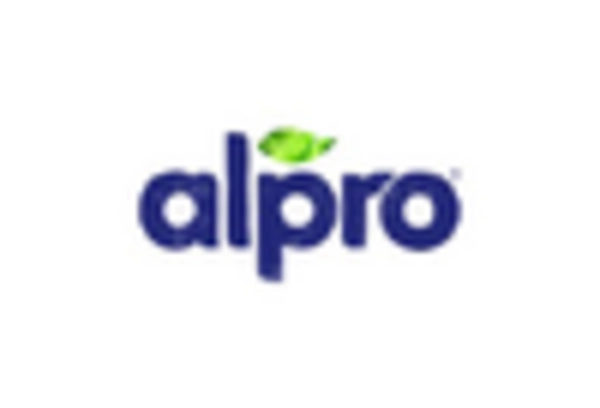Influence of Dietary Trends
The plant based-food market is significantly influenced by various dietary trends, such as veganism, vegetarianism, and flexitarianism. These dietary movements are gaining traction among consumers who are increasingly seeking to incorporate more plant based foods into their diets. Data suggests that approximately 10% of the US population identifies as vegan or vegetarian, while a larger segment is adopting a flexitarian approach, which emphasizes plant based foods while allowing for occasional meat consumption. This shift in dietary preferences is likely to propel the growth of the plant based-food market, as brands respond by developing innovative products that cater to these evolving consumer needs.
Rising Demand for Meat Alternatives
The plant based-food market is experiencing a notable surge in demand for meat alternatives, driven by a growing consumer preference for healthier and more sustainable diets. Recent data indicates that the sales of plant based meat products have increased by approximately 30% over the past year, reflecting a shift in consumer behavior. This trend is likely influenced by the increasing awareness of the health risks associated with red and processed meats, as well as the environmental impact of traditional livestock farming. As consumers seek to reduce their meat consumption, the plant based-food market is positioned to benefit significantly from this transition, with companies innovating to create more appealing and diverse meat substitutes.
Support from Food Industry Innovations
The plant based-food market is experiencing robust support from innovations within the food industry, which are enhancing product quality and variety. Advances in food technology, such as improved flavor profiles and textures, are making plant based products more appealing to a broader audience. Companies are investing heavily in research and development to create plant based alternatives that closely mimic the taste and experience of traditional animal products. This innovation is crucial, as it addresses consumer concerns regarding the palatability of plant based foods. As these advancements continue, the plant based-food market is expected to expand, attracting both dedicated plant based consumers and those who are simply curious about trying new options.
Growing Awareness of Environmental Impact
The plant based-food market is benefiting from a growing awareness of the environmental impact associated with food production. Consumers are becoming more conscious of the carbon footprint of their dietary choices, leading to a preference for plant based options that are perceived as more sustainable. Research indicates that plant based diets can reduce greenhouse gas emissions by up to 50% compared to traditional meat-based diets. This awareness is prompting consumers to seek out plant based foods as a means of contributing to environmental sustainability. As a result, the plant based-food market is likely to see continued growth as more individuals prioritize eco-friendly choices in their eating habits.
Increased Availability of Plant Based Products
The expansion of the plant based-food market is also attributed to the increased availability of plant based products across various retail channels. Major grocery chains and specialty stores are now dedicating more shelf space to plant based options, making it easier for consumers to access these products. According to industry reports, the number of plant based products available in US supermarkets has grown by over 50% in the last two years. This enhanced accessibility is likely to encourage more consumers to try plant based foods, thereby driving market growth. Furthermore, the rise of online grocery shopping has facilitated the distribution of plant based products, allowing consumers to explore a wider range of options from the comfort of their homes.
















